This is a placeholder for the Yext Knolwedge Tags. This message will not appear on the live site, but only within the editor. The Yext Knowledge Tags are successfully installed and will be added to the website.
,
This is a placeholder for the Yext Knolwedge Tags. This message will not appear on the live site, but only within the editor. The Yext Knowledge Tags are successfully installed and will be added to the website.
Blog
Blog
Josh's Dumpsters
Over 10 Years' Experience
Locally Owned
Same-Day Delivery
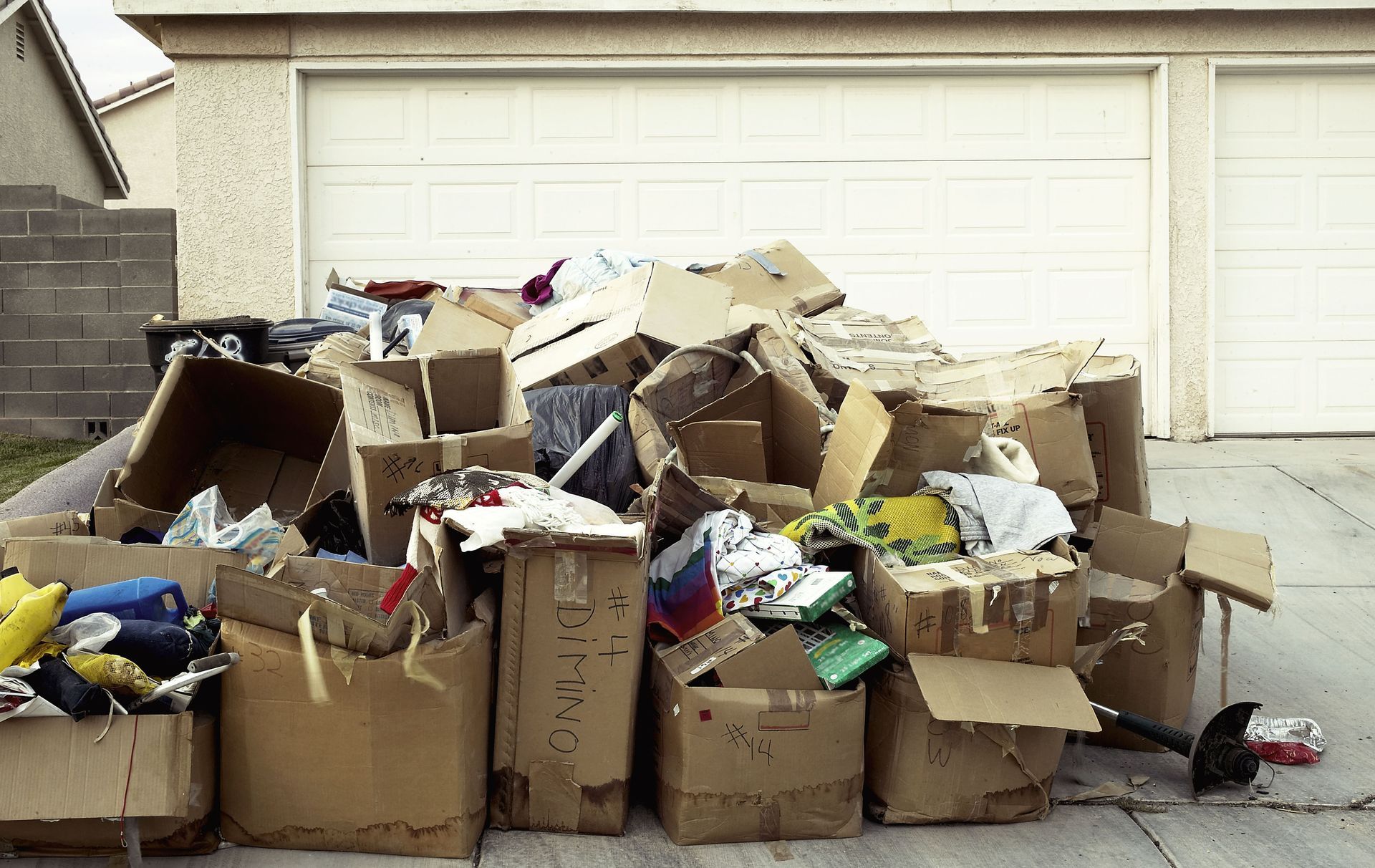
By 7073131987
•
January 14, 2025
Life gets messy. Whether it's a long-awaited decluttering project, a sudden move, the aftermath of a renovation, or dealing with the estate of a loved one, sometimes you need more than just a few trash bags. In steps a trusted cleanout service to take control. You might think all cleanout services are interchangeable, but think again – they're not. This guide explores everything you need to know to find the right service for your needs. Jump straight into the good stuff with our quick-reference guide. A cleanout that works for you starts with identifying your unique pain points and areas for improvement. We help homeowners haul away the unwanted stuff that's cluttering their living spaces with our reliable residential cleanout services. Need to gut and refresh your office or store? Our commercial cleanout services get the job done. You need a cleanout service you can count on - but with so many options, where do you start? Digging deeper, we unbundle Research and Reading. Don't settle for a single option - explore multiple quotes to get the upper hand. Before you let a cleanout crew in the door, ask yourself: what do I need to know? Streamline Your Space: The Cleanup Basics Buckle up! We're about to break down what you can expect from here on out. The morning of the cleanout, when the dust settles and reality sets in, is a moment of truth. Once the furniture's gone and the old photos are scattered everywhere, you're left standing in the midst of a transforming space. All cleared out – it's a fresh start! The time has come to wrap up our discussion and distill the essence of what we've discovered so far. Get a handle on your cleanout needs and you'll be ahead of the game. Knowing what you require is the first step to getting the job done right. It's time to get specific: what are your must-haves? Is it a whole-house cleanout, a garage overflowing with forgotten treasures, or a storage unit bursting at the seams? Different services specialize in different things. Residential Cleanout Services Residential cleanouts cover a broad range of needs, from single-item removals to whole-house projects. This might include furniture removal, attic cleanouts, appliance removal, hot tub removal, and cleaning up after hoarders. Some companies offer specialized services for sensitive situations like estate cleanouts, requiring extra care and compassion. Consider the size and scope of the job. This helps you determine whether you need a small truck or a dumpster rental. Also, consider your budget and how quickly you need the junk gone. These things help you ask about available services like eco-friendly disposal for residential junk. Think about what you need to have removed, whether it's a hot tub, an air conditioner, scrap metal, or general unwanted junk. Commercial Cleanout Services Commercial cleanouts involve different considerations than residential cleaning. Commercial cleanout services often help with warehouse cleaning, real estate clearing, and renovations for retail stores. These situations need pros who can handle unique equipment, trained professionals, or large containers. Look at commercial services and what each team specializes in when figuring out who you will be going with. You could be dealing with renovation debris, excess stock, relocating and selling products from an office and warehouse, or old furniture after business updates. Construction debris removal and carpet removal are common needs. Be sure to get a free estimate from the removal service. Choosing the Right Cleanout Service So, how do you pick the right cleanout services team? Let's explore. Junk it with Josh's Research and Reviews Start with online research. Sites like Thumbtack let you compare different services and pricing. Reading online reviews (like these) on Google , Yelp, and social media can give you an inside look at a company's reliability and customer satisfaction. These reviews can provide insight into trustworthiness and give clients peace of mind. They can also offer helpful information about their service area and what types of items they remove, such as hot tubs or other large items. Get Multiple Quotes Contact several cleanout companies for quotes. Be sure to clearly describe what you need removed, whether it's junk removal for various rooms like basements, attics, and garages, or if an estate cleanout is needed. Also, mention any specific requests ( this source agrees ). Some companies will even send people out for free on-site estimates. This allows you to compare not just pricing but also the help they provide, their expertise, and their approach. Questions To Ask Cleanout Services Asking many different questions can make this process easier, lead to a better-informed experience, and ultimately, better decision-making. Licensing and insurance: Make sure the service has appropriate licensing and liability insurance to protect yourself. Disposal practices: Find out whether items will be simply hauled to a dump or if there's a focus on donation, recycling, and eco-friendly options. Crew experience: Some companies (such as We Love Junk) pride themselves on extensively training their junk haulers. This ensures experienced professionals handle your belongings, not just day laborers or strangers. Choosing reliable movers prevents damage and ensures smooth handling of potentially valuable items. A professional service can help identify items for donation or sale, simplifying the process for you. Included services: See what's included in the pricing for an estate cleaning or cleanouts. Clarify if it covers everything or if prices change due to unique items (like these uncommon cleanouts). Make sure you also ask about their service areas. Some companies focus on specific regions, such as Montgomery County, Delaware County, or Bucks County. Understanding their service areas ensures they can handle your cleanout regardless of location. The Cleanout Process: What to Expect Cleanout day can feel hectic, but some preparations can ease the stress. Before the Cleanout Before any cleanout, you should go through all areas yourself . Take this moment to organize your belongings and identify unwanted items. Separate essential documents, cherished items, and other important things. Clearly label items for removal to simplify the process for the cleanout crew. This will help them know what should be taken and ensure that you have no unwanted junk left. During the Cleanout Let the professionals work their expertise on cleanout day. Your job is to ensure they remove the correct junk or items. Feel free to ask questions. Relax now that you've reached the cleaning day. Professionals are there to handle the junk and debris, making the process easy and painless. Ask questions throughout and enjoy the previously stressful experience becoming more manageable. After the Cleanout Take this opportunity to admire your fresh, open space. Breathe deeply and appreciate a simpler, nicer personal space in your property. It will likely look dramatically different from when it needed cleanout services. Last but not least, we've reached the final word. This is where all the pieces come together and the big picture becomes clear. Rooting out a reliable cleanout service can be a real hurdle. However, by following these tips, obtaining multiple price quotes, and hiring experts to handle your junk, the process becomes manageable. Cleanout services are the hero you need when clutter takes over. Whether it's old trinkets gathering dust, overloaded storerooms, or just plain junk piling up, they'll come to the rescue. With a plan and reliable, affordable, courteous help, you can find peace of mind as your property transforms. Life changes, like a death in the family, can make dealing with accumulated items and unwanted junk a daunting task. Whether the reason is a difficult life event or simply the need for decluttering, choosing reliable cleanout services makes the process smoother. Focus on the important things, and let the professionals handle the rest. They can even provide same-day junk removal, so you can get your property cleaned out quickly. This professional junk removal can remove the stress of a daunting task.
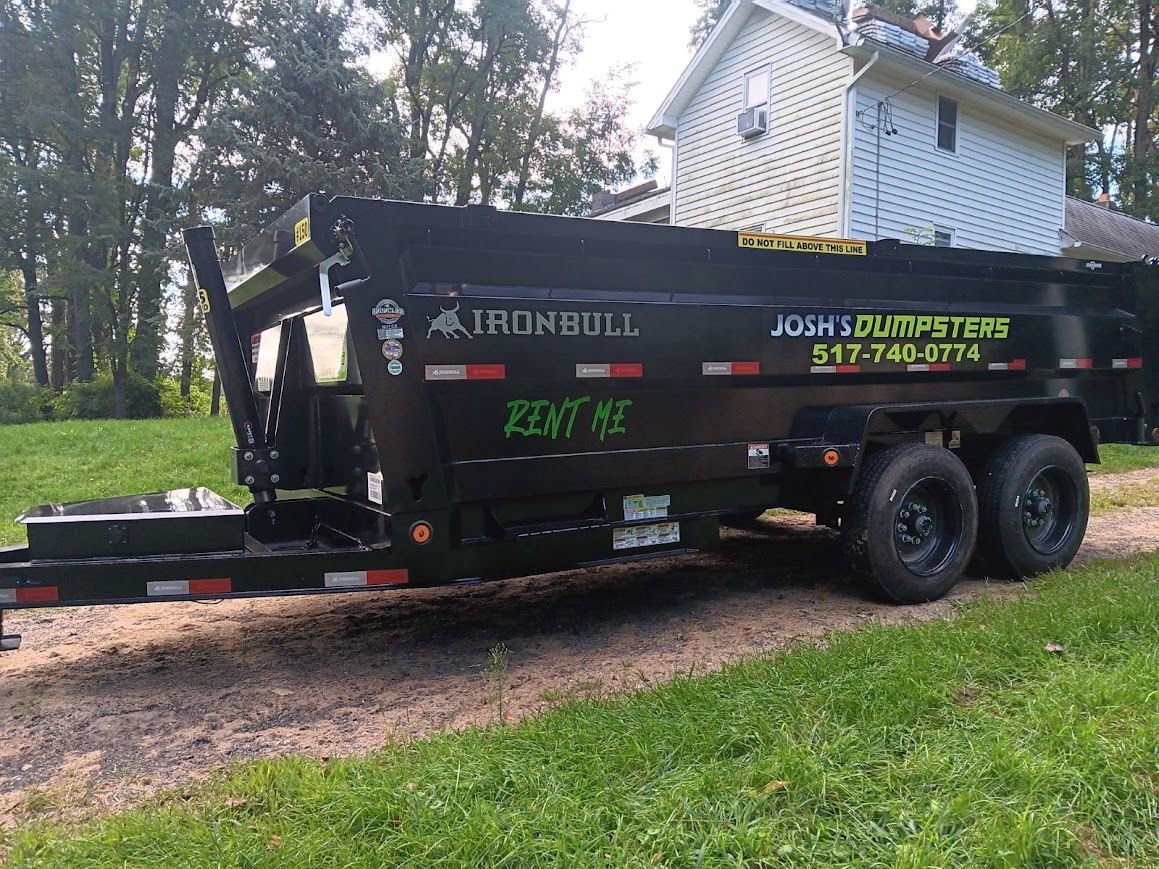
By 7073131987
•
January 14, 2025
Top Benefits of Dump Trailer Rentals for Your Project Tackling a DIY project or major cleanout? Dump trailer rentals can simplify your work. Whether it's yard debris, construction waste, or moving bulky furniture, renting a dump trailer offers flexibility for your hauling needs. This article explores dump trailer rentals, offering valuable information on sizes, costs, and usage tips. Discover why renting might be better than buying and how choosing the right size saves money. Table of Contents: • Why Rent a Dump Trailer? • Navigating Dump Trailer Rentals: Sizes and Costs o Size Matters: Choosing the Right Dump Trailer o Budgeting Your Dump Trailer Rental: What to Expect • Smart Tips for Renting and Using Dump Trailers o Why Dump Trailers are a Great Hauling Solution o Essential Safety Considerations with Dump Trailer Rentals • Conclusion Why Rent a Dump Trailer? Renting a dump trailer may seem unnecessary, but compare the cost to buying a new one. Used dump trailers cost between $5,000 and $10,000, especially from manufacturers like Iron Bull Consider hidden costs like storage space, ongoing maintenance, and insurance. Renting lets you choose the right trailer size for each project and avoids idle equipment. Plus, skip the down payment and depreciation headaches. Use your credit card for the rental and put the large purchase of a trailer on a retailer credit card. Navigating Dump Trailer Rentals: Sizes and Costs Dump trailer rentals come in various sizes. This guide helps you consider your needs: Size Matters: Choosing the Right Dump Trailer Choosing the wrong size leads to extra trips or wasted money on unused space. • Small Dump Trailers (5-10 Cubic Yards): Ideal for smaller residential projects like garage cleanouts, garden debris removal, and weekend DIY projects. • Medium Dump Trailers (10-20 Cubic Yards): Perfect for larger household tasks such as landscaping, furniture disposal, light construction, roof tear-offs, or kitchen demolitions. • Large Dump Trailers (20+ Cubic Yards): Designed for major commercial, construction, and demolition sites needing substantial debris removal. Budgeting Your Dump Trailer Rental: What to Expect Dump trailer rental pricing varies based on size and your specific requirements. Trailer Size Average Daily Rental Cost Average Weekly Rental Cost Small (10 cu yd) $150 Daily Rate or $350 Weekly Rate Medium (15 cu yd) $175 Daily Rate or $420 Weekly Rate Large (20 cu yd) $200 Daily Rate or $475 Weekly Rate These are estimates from rental sources like josh's dumpsters, which offer dump trailer rentals among roll off Containers. Prices depend on location, time of year, and the inclusion of hydraulic surge breaks. Smart Tips for Renting and Using Dump Trailers Here's essential information on using dump trailers, including safety reminders. Why Dump Trailers are a Great Hauling Solution Dump trailers handle lifting, allowing hydraulic systems to tip for smooth unloading, according to Saybrook Rentals. This is more efficient than multiple wheelbarrow trips, especially for heavier debris like soil, gravel, and demolition waste. This makes dump trailers ideal for those heavy-duty cleanouts and projects using concrete tools or compaction equipment. They are useful for a wide range of DIY log splitting projects as well. For air compressor rentals, power tools and scissor lifts check your local tool rentals. Essential Safety Considerations with Dump Trailer Rentals Secure items before traveling to prevent hazards and dangerous driving scenarios. Check with your rental provider about weight limits to avoid fines. Safe and steady maneuvering prevents accidents due to unbalanced weight. If you need a light tower for evening projects consider adding that to your dump trailer rental. Conclusion Rubber wheel dumpster rentals are a convenient and often economical solution for DIY projects and commercial hauling. This approach offers the right equipment without the hassle of ownership. With various sizes and affordable rental rates, dump trailers are accessible for large cleanups. Practice mindful safety while enjoying their simplicity and look for local ads offering holiday promotions.
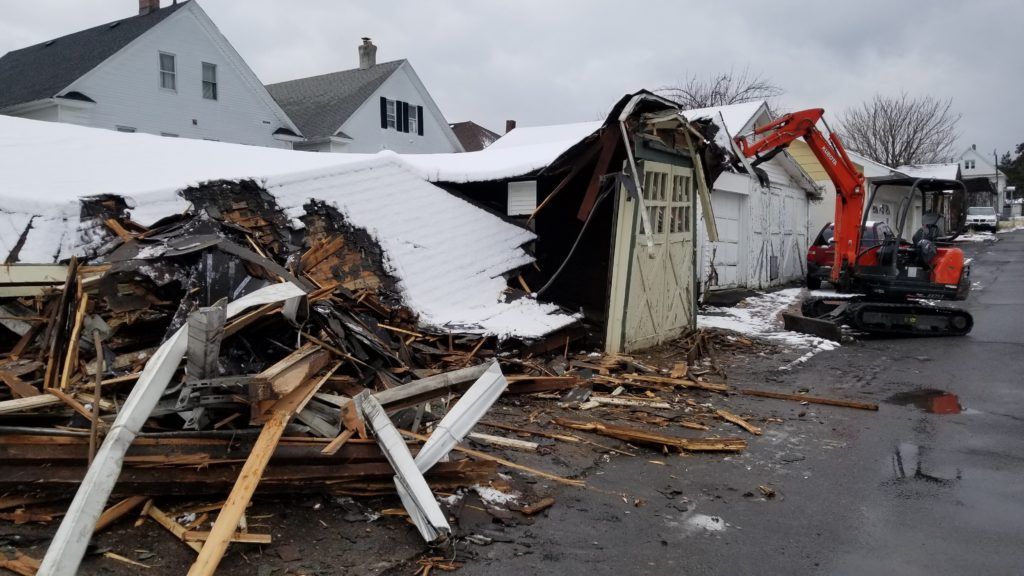
By 7073131987
•
December 27, 2024
Taking on a demolition, excavation, or renovation project? Demolition excavation debris removal is a crucial part of these construction projects. This guide covers everything about debris removal. We'll explore planning, safety measures, disposal options, and sustainable practices for handling demolition debris. We’ll equip you to tackle your next demolition excavation debris removal project confidently. Table of Contents: • Planning Your Demolition Excavation Debris Removal o Identifying Debris Types o Estimating Debris Volume • Safe and Efficient Debris Removal o Safety Measures o Equipment Selection o Demolition Excavation Debris Removal: Step-by-Step • Disposal Options and Best Practices o Recycling and Repurposing o Landfill Disposal o Working with Professionals • Demolition Excavation Debris Removal Cost Considerations o Factors Affecting Cost o Tips for Reducing Expenses • Conclusion Planning Your Demolition Excavation Debris Removal Before demolition work begins, create a solid debris removal plan. This ensures a smooth, safe, and budget-friendly process. Start by assessing the waste material you'll be dealing with. Identifying Debris Types Different debris materials require different handling. Concrete debris, wood products, metal, and asphalt each have specific disposal methods. Knowing the types of debris generated allows you to arrange the right equipment and disposal sites. Check out resources for construction and demolition waste removal. Estimating Debris Volume Accurately estimating debris volume is key to choosing the right dumpster size and avoiding higher costs. It's always better to overestimate than underestimate. An overflowing dumpster can halt your entire project. Find more details on recycling demolition debris and managing large quantities of waste from demolition activities. Safe and Efficient Debris Removal Safety should always be the top priority on demolition and excavation sites, which are inherently hazardous. Proper precautions minimize risks and facilitate smooth debris removal. Safety Measures Ensure everyone on-site wears appropriate safety gear, including hard hats, gloves, and protective eyewear. Establish clear safety zones and traffic flow patterns for equipment and workers. Equipment Selection Selecting the right equipment, like a roll-off dumpster, is crucial. Bobcats, excavators, dump trucks, and sometimes cranes, ensure safe and quick debris removal. WM offers information on different dumpster options. Learn why you should repurpose concrete from Big Easy Demolition. This is part of the process for safe removal of construction waste. Demolition Excavation Debris Removal: Step-by-Step 1. Prepare the Site: Secure the surrounding area, disconnect utilities, and establish clear access points. 2. Demolish Carefully: Controlled demolition minimizes debris scattering and simplifies cleanup. This involves carefully planning and executing the demolition process to ensure safety and efficiency. 3. Sort and Segregate: Separate different debris types for appropriate disposal and recycling, considering sustainable materials management. This step involves identifying different materials such as wood, concrete, metal, and others. 4. Load and Transport: Utilize suitable heavy equipment to load debris into dumpsters or trucks. Choose the appropriate equipment based on the type and amount of debris being handled. 5. Dispose Responsibly: Transport debris to designated facilities for proper recycling or disposal in accordance with local authorities and environmental protection guidelines. Ensure all waste disposal is handled according to regulations. Disposal Options and Best Practices Avoid simply dumping everything in a landfill. Explore eco-friendly waste disposal solutions first. These options contribute to sustainable materials management, minimizing environmental impact and promoting responsible waste management practices. Recycling and Repurposing Many demolition materials, including demolition debris, can be recycled or repurposed. Crushed concrete can be used as road base. Wood can be salvaged and repurposed. Repurposing materials saves landfill space, reduces costs, and is good for the environment. Landfill Disposal Sometimes landfill disposal is unavoidable. However, ensure the landfill complies with environmental regulations. Working with Professionals Professional demolition excavation debris removal companies, offering demolition services, are well-versed in best practices. They handle everything smoothly, safely, and legally. They can also advise on how to estimate debris weight, especially in large quantities, generated by demolition projects or renovation projects. Junk King explains what construction waste they remove. This information helps in understanding the types of debris handled during junk removal services and ensures the safe removal of waste. Demolition Excavation Debris Removal Cost Considerations Several factors influence debris removal costs. Let's explore these factors. Factors Affecting Cost • Debris Type: Hazardous materials, such as asbestos, require specialized handling, increasing the cost. Different demolition materials may also have different disposal fees. • Debris Volume: More debris necessitates larger dumpsters and additional hauling trips, resulting in higher costs. Proper estimation of debris volume is essential for managing your budget effectively. This may involve understanding the debris weight and selecting appropriate debris dumpsters. • Location: The distance between the project site and the disposal site impacts transportation costs. Consider the logistics and transportation fees involved in moving demolition materials to designated facilities. Factor in additional transportation costs for projects located farther away from disposal centers. • Accessibility: Sites with limited access increase removal complexity and expenses. The ease of access to the site determines the efficiency and cost of debris removal. Tips for Reducing Expenses Recycling is one of the ways to cut costs, so prioritize recycling as much debris as possible, including concrete, wood, and metal. Selling scrap metal can help offset expenses and promote sustainable material management. Choosing the right dumpster size helps to avoid paying for unused space. Your disposal provider can help you find the most suitable dumpster option for your project, including the debris dumpster, whether you're doing controlled demolition, construction site cleanup, or even water damage restoration. Working efficiently helps to keep your project on schedule, which reduces equipment and labor costs. Big Easy Demolition provides valuable insights on interior demolition preparation to help streamline the process. Conclusion Successful demolition excavation debris removal involves numerous factors, from planning to disposal. Careful consideration of each step is crucial for project success. Proper planning includes determining the type of debris generated, like concrete, wood, clay tile, asphalt shingles, and other construction debris. Following the guidelines in this guide ensures a clean site and environmental protection. Always prioritize safety, sustainable practices, and cost-effectiveness. Responsible waste management, which often includes the use of a roll-off dumpster, is essential for completing demolition projects and ensuring proper site cleanup.
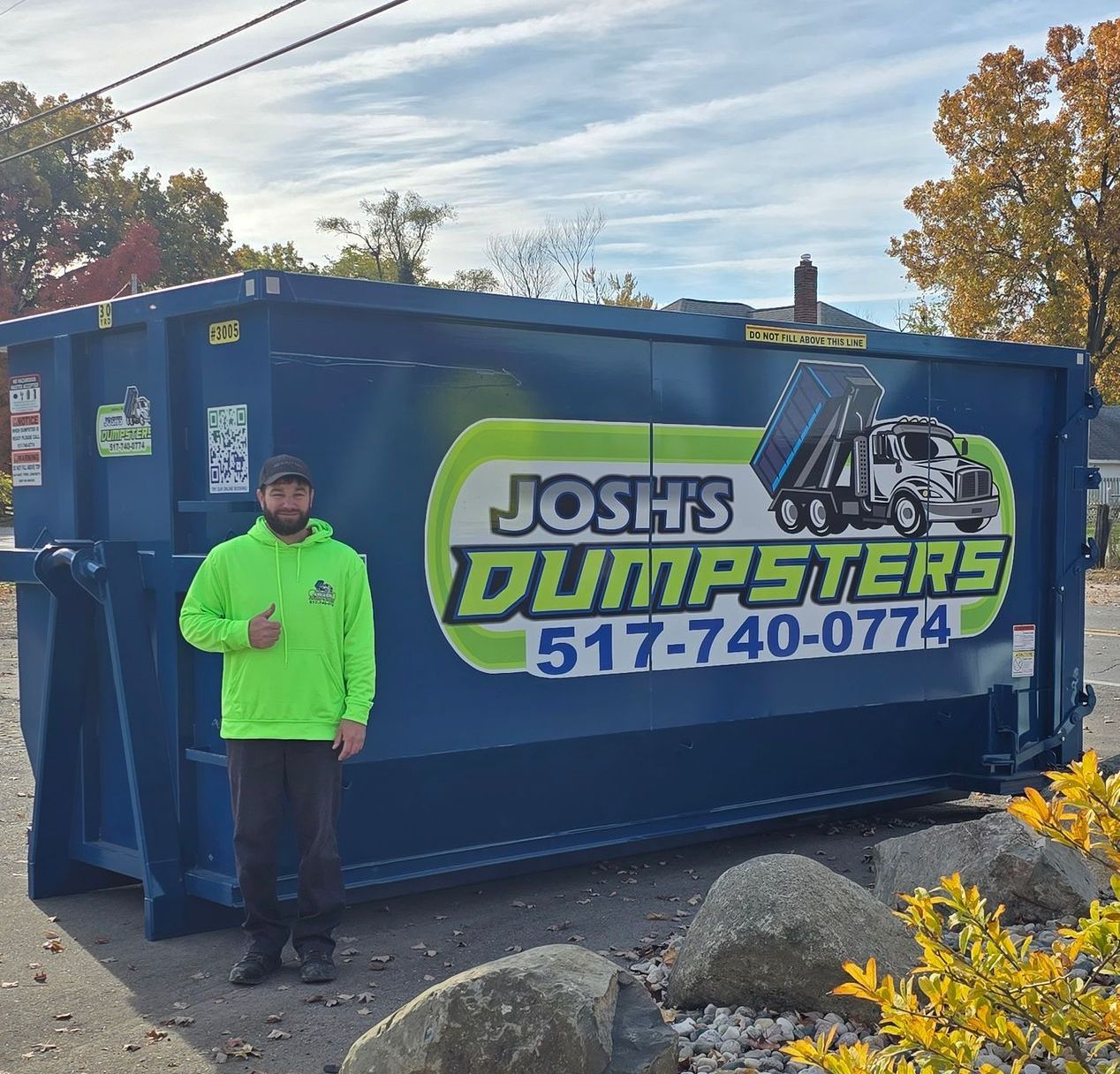
By 7073131987
•
December 23, 2024
Choosing the Right Size & Type of Dumpster So, you're staring at a mountain of debris and thinking, "I need a dumpster." This dumpster guide will help you choose the right roll-off dumpster for your project. This comprehensive dumpster guide breaks down dumpster sizes, usage, and key considerations for renting a dumpster. Table Of Contents: Dumpster Guide: Choosing the Right Roll-Off Container Understanding Dumpster Sizes Matching the Dumpster to Your Project Weight Limits: A Crucial Factor Placement and Permits Cost and Rental Periods Dumpster Do's and Don'ts Conclusion Dumpster Guide: Choosing the Right Roll-Off Container Picking the right dumpster size is more than just guesswork. It’s about understanding your project’s needs, which means considering the type and amount of waste. Use our dumpster guide to learn more about dumpster rentals and order online. Understanding Dumpster Sizes Dumpsters are measured in cubic yards. A cubic yard is 3 feet long, 3 feet wide, and 3 feet high––think of it as a big refrigerator box. Most dumpster rental companies offer sizes from 10 to 40 cubic yards. A 10-yard dumpster is good for heavy materials and a 20-yard dumpster is better for home cleanouts. Here's a handy dumpster size comparison chart summarizing common dumpster sizes and their typical uses: Dumpster Size (Cubic Yards) Dimensions (L x W x H) Typical Use 10 12' x 8' x 3.5' Small cleanouts, heavy debris like concrete 15 14' x 8' x 4' Small to medium cleanouts, roofing jobs 20 14' x 8' x 5' Home cleanouts, small renovations 30 16' x 7.5' x 7' Larger renovations, whole-house cleanouts 40 22' x 7.5' x 8' Major renovations, demolition Keep in mind that dimensions might vary slightly, but the volume remains consistent. These sizes are examples of what would be considered yard dumpsters. When it comes to dumpsters for rent, there are several options including roll-off dumpsters. Matching the Dumpster to Your Project First, consider the scope of your work. A small bathroom remodel versus gutting a whole house will have very different dumpster needs. Second, consider how much you're tossing. Are you getting rid of bulky furniture or lots of small items? If you’re unsure, contact customer service and the company directly; Waste Connections can provide expert advice about yard commercial dumpsters. If you are looking for a budget dumpster, customer service contact can help find a dumpster for your budget. Weight Limits: A Crucial Factor Each dumpster has a weight limit for safety and local regulations. Heavy materials like concrete or roofing shingles will max out the weight faster than bulkier but lighter items. Exceeding weight limits means extra fees, so plan accordingly. Consult Josh's Dumpsters to estimate your debris weight and choose your roll-off container size. For reference, a standard pickup truck can hold about one cubic yard. Pickup loads are usually used for smaller amounts of trash. Placement and Permits Think about where the dumpster will go. Your driveway is common, but make sure you have enough space and it's on a flat, stable surface. Consider how many pickup loads the container can hold. For street placement, you may need a permit. Check your local regulations, especially in residential areas. Some people underestimate the amount of cubic yards they need to fill and choose too small of a dumpster. Using this dumpster guide and thinking about placement before will help prevent needing another delivery or container. Cost and Rental Periods Costs are influenced by dumpster size, rental period, and location. Gallon trash bags are convenient for lighter jobs, however for large jobs renting a dumpster is cheaper than using trash bags. For example, gallon trash would be a waste for something like a demolition. Get quotes from multiple companies like commercial dumpster providers or yard roll providers. Compare pricing–– Budget Dumpster pricing guide can offer some insight. Also, ask about rental periods––most companies give you a set number of days. Extra days equal added costs. Be upfront about materials––some debris may come with an extra charge (such as hazardous waste). Ask about dumpster prices before ordering. Think of what dumpster rental would choose you. If you decide to rent a dumpster you may want to check online ordering. Dumpster Do's and Don'ts Don’t overfill the dumpster––the top must be level. Avoid putting prohibited materials like hazardous waste in it. Some companies even restrict tires or appliances––in that case, consider appliance removal. Using pickup broken container schedule customer service may assist with getting your dumpster picked up on schedule. Some rental providers also provide pickup broken container service and container schedule service. Many also offer container schedule customer service, missed pickup broken container schedule, and schedule delivery service contact if needed. For missed pickups and broken containers call your service dumpster company to help sort it out. Follow your provider's guide for specific materials. Are you ready to tackle your next project armed with this dumpster guide? Remember that choosing the right dumpster streamlines your project, protects the environment, and protects your budget. For larger bags that you need for clean-up or something lighter, see large bags dimensions for reference to choose what bag size will be best for your needs. Conclusion This dumpster guide provides insights into sizes, project matching, and crucial cost factors. We discussed the nuances of dumpster selection, dumpster size comparison, responsible disposal, and how many cubic yards fit in standard pickup truck. This dumpster guide also reviewed critical questions about weight limits and securing necessary permits. It outlined guidelines for proper loading, the “do’s and don’ts” of usage, and the commercial dumpster. It serves as a trustworthy dumpster guide to ensure efficiency and compliance in managing waste removal projects.
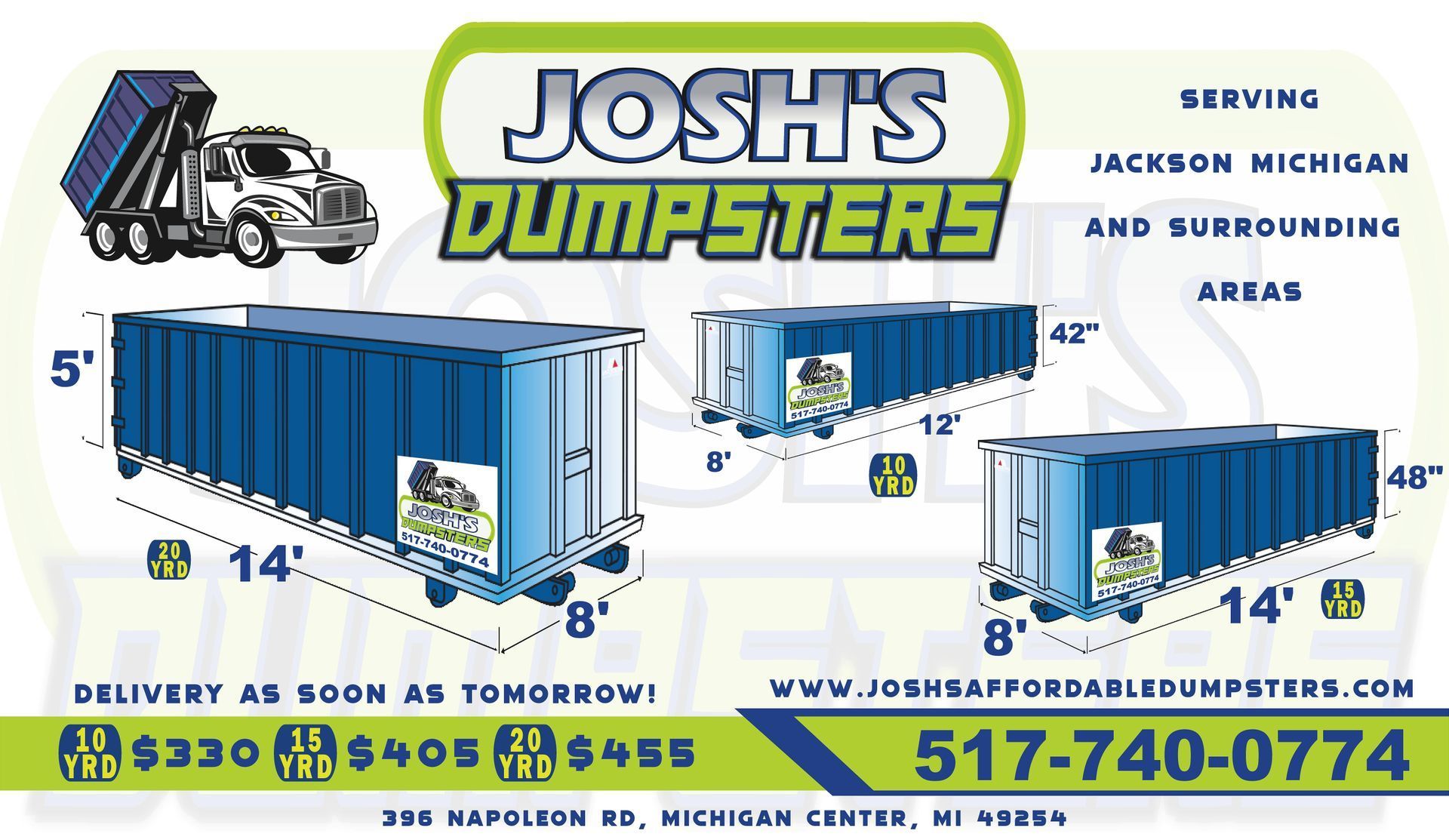
By 7073131987
•
December 16, 2024
Ultimate Guide to Dumpster Rental Sizes and Uses Planning a big cleanout, renovation, or construction project? This often means you’ll need a temporary roll-off dumpster for all that debris. This is where dumpster rental comes in handy. But with so many options, sizes, and local regulations, renting a dumpster can feel overwhelming. This guide will break down everything you need to know about residential dumpster rental and commercial dumpster rental, from choosing the right size dumpster to understanding permits and regulations. Table Of Contents: Understanding Dumpster Sizes 10-Yard Dumpsters 20-Yard Dumpsters 30-Yard Dumpsters Dumpster Rental Cost Factors Permits and Regulations for Dumpster Rental Preparing for Dumpster Delivery and Pickup Making Your Dumpster Rental Experience Smooth Conclusion Understanding Dumpster Sizes Choosing the right dumpster size is crucial for both cost-effectiveness and practicality. Too small, and you’ll end up paying for multiple pickups or overfilling the waste dumpster. Too big, and you’re wasting money on space you don't need. Dumpster sizes are measured in cubic yards, and the right one for your project depends on the type and amount of waste you need to dispose of. Let's dive into different sizes to help you with check availability and choose what dumpster holds enough for your junk removal. 10-Yard Dumpsters These are perfect for small cleanups and remodeling projects like a small bathroom or kitchen remodel. Think garage cleanouts, small landscaping projects, removing old furniture, or appliance removal. 10-yard dumpsters typically hold about three pickup truck loads. Dimensions average approximately 12’L x 8’W x 4’H. They are best suited for heavier debris, making them a great choice for projects involving concrete, bricks, or dirt. Remember to check service availability in your area. 20-Yard Dumpsters A good all-around choice for residential projects, these can handle larger cleanouts, roofing jobs, or a significant amount of construction debris. Many prefer 20-yard dumpsters due to their versatility. If you’re clearing out a garage, basement, attic, or a small construction site, a 20-yard dumpster is generally a good fit. While a forty-yard dumpster may be larger, it could be too large for residential use. A twenty-yard class should hold just the right amount. Before scheduling a dumpster, be sure to check service in your area. 30-Yard Dumpsters These are best for large-scale renovations, whole-house cleanouts, major landscaping overhauls, or even commercial or industrial demolition projects. Determining what dumpster size to rent is important. It helps estimate the dumpster rental cost factors to determine if commercial dumpster rental prices fit within your budget or if you are better off looking for bulk trash pickup. Dumpster Rental Cost Factors Dumpster rental pricing isn’t always straightforward. Several factors can influence rental prices, including location, dumpster size, rental period, weight limit, and landfill fees. For instance, dumpster services in densely populated areas might have higher prices due to limited landfill space and stricter regulations. Additional fees may apply for exceeding weight limits, hazardous waste disposal, and exceeding the rental periods. It's essential to clarify these cost factors with the dumpster rental company upfront to avoid unexpected charges and ensure transparent pricing. Be sure to ask about any additional fees or other considerations when trying to schedule dumpster rentals, including things like hazardous materials. Be aware of the waste disposal laws, specifically concerning hazardous waste. Permits and Regulations for Dumpster Rental Before renting a dumpster, check with your local municipality about permit requirements. Regulations can vary greatly between locations. A Solid Waste Ordinance will outline the rules regarding dumpster placement (such as street placement versus driveway), weight allowances, permitted materials, and rental periods. Obtaining the necessary permits beforehand helps avoid potential delays, fines, and ensures a smooth rental process. Preparing for Dumpster Delivery and Pickup Before the dumpster delivery, choose a suitable spot on your property for the dumpster placement. Ensure there’s clear access for the delivery truck and enough space for the dumpster. Check for low-hanging wires and other overhead obstructions. Contact your local utility companies to verify the location of any underground utilities if necessary. For the bulk trash pickup after your rental period is up, prepare the area by moving your car. Making Your Dumpster Rental Experience Smooth Before renting, contact the dumpster rental company to discuss what can and cannot go into the dumpster. Ask about any restricted materials, including appliances, old furniture, concrete, soil, bricks, trees, shrubs, batteries, tires, and oils. Understanding these restrictions upfront helps avoid potential issues and extra fees. Some companies offer recycling services for certain materials, so be sure to inquire about those options. Knowing whether you need residential or commercial dumpsters will affect your waste collection options. Check availability and consider dumpster rental prices, waste disposal needs, and local regulations for waste management. Conclusion Renting a dumpster doesn’t have to be complicated. By understanding dumpster sizes, cost factors, local regulations, and preparing in advance, your rental experience will be much smoother. Whether you need a dumpster for construction debris or bulk waste, a little planning and preparation goes a long way. Choose a dumpster size that best suits your trash collection needs. Carefully think about what dumpster holds all your junk removal. Don't automatically get the largest dumpster sizes available. Smaller yard roll off dumpsters can be a better fit for certain projects. Remember, a smaller yard roll-off dumpster can be more convenient and cost-effective than a forty-yard dumpster if your project doesn't require that much space. Don't forget to consider whether a 10 yard dumpster fits better for your junk removal needs.

By 7073131987
•
December 15, 2024
Efficient Junk Removal Solutions for Clutter-Free Living Got a pile of unwanted items staring back at you? Junk it with Josh's Many of us face the challenge of junk removal, from an old couch to leftover construction debris. This guide offers practical tips and insights to help you reclaim your space, whether you’re prepping for a move, clearing out the garage, or tackling spring cleaning. Understanding Your Junk Removal Needs First, assess the situation. What type of junk are you dealing with—furniture, yard waste, or construction debris? The type and amount will determine your best approach. A small pile of old clothes might need a trip to donation centers, while a garage full of furniture might require professional junk removal services . For most unwanted items, your local landfill or recycling center is an option. Remember, electronics recycling and hazardous waste may have specific disposal guidelines. DIY Junk Removal: When It Makes Sense For smaller jobs, handling junk removal yourself can be cost-effective if you have the time, a truck, and the muscle to haul items. Donate usable items to charity for a potential tax deduction. Dumpster Rental is a great option for the diy project Consider the box springs, mattresses box springs, and mattresses box. Local landfills and recycling centers accept most items. Just remember to inquire about specific guidelines for certain materials like electronics. Hiring Professional Junk Removal: A Stress-Free Approach For larger or more complex projects, professionals can be a lifesaver, handling everything from heavy lifting to proper disposal. They're insured against accidents, offering peace of mind, especially with heavy furniture. Many offer full-service junk removal. Companies like 1800 got junk are known for their full-service approach. They've received recognition from US News for responsible disposal practices, diverting items from landfills through donation and recycling. Forbes also recognizes the company for responsible business practices. Navigating Junk Removal Services When considering professional removal services, focus on getting a free estimate. Reputable companies provide upfront quotes to avoid surprises. You can request an account request form from various companies. What to Look for in a Junk Removal Company Several factors distinguish professional removal companies: Licensed and Insured: This protects you from liability. Upfront Pricing: Clear, no-obligation estimates are key. Responsible Disposal: Ask about donation and recycling practices. Customer Reviews: Check online reviews on sites like Google and Facebook before choosing. Over 100 five-star reviews can be a strong endorsement for hauling services and other similar businesses. Preparing for Your Junk Removal Before the team arrives, gather the junk in one location for smooth junk removal. This also helps ensure an efficient removal junk removal service. When deciding whether to toss an item, ask: “When did I last use it?” Consider the extra space you'll gain. Think about tables bookcases, dining tables, dining tables bookcases, pool tables, tubs hot tubs, and hot tubs hot tubs. Decluttering creates a clearer, more breathable space. The Cost of Junk Removal Pricing depends on the amount and type of junk. Local companies often offer roll-off dumpster rentals for DIY projects. Check for availability signs to determine rental options. This can be a solution for major renovations. Contact them directly for an accurate estimate. A full-service company's quote should include labor, hauling, and disposal. Junk Removal: A Greener Approach Junk it with Josh's prioritizes eco-friendly practices, recycling up to 60% of collected items. This diverts reusable materials from landfills. Choosing eco-friendly services adds another benefit to decluttering, whether you’re discarding a few bulky items or doing a full-scale cleanup. It reduces our collective footprint. Take care of that property management headache, including commercial junk. Beyond the Basics: Specialized Junk Removal Specialized removal services handle items like hot tubs, exercise equipment, and pianos. Some items, especially those with hazardous materials, may have added fees. Discuss these during the estimate process. This is important for major renovations, minor touchups, or even routine household and commercial junk removal. Office cleanouts and store remodels benefit as well. Conclusion Tackling junk removal, whether DIY or professional, creates more space and a clearer environment. With careful planning and efficient execution, you can transform a messy space into an organized one. From moving services to clearing unwanted items and even easy junk removal, we’ve covered how to get your free estimate, check availability, and haul away unwanted things.
SERVING
This is a placeholder for the Yext Knolwedge Tags. This message will not appear on the live site, but only within the editor. The Yext Knowledge Tags are successfully installed and will be added to the website.
and surrounding areas
HOURS
This is a placeholder for the Yext Knolwedge Tags. This message will not appear on the live site, but only within the editor. The Yext Knowledge Tags are successfully installed and will be added to the website.
Monday
Tuesday
Wednesday
Thursday
Friday
Saturday
Sunday
This is a placeholder for the Yext Knolwedge Tags. This message will not appear on the live site, but only within the editor. The Yext Knowledge Tags are successfully installed and will be added to the website.
HOURS
Monday
Tuesday
Wednesday
Thursday
Friday
Saturday
Sunday
This is a placeholder for the Yext Knolwedge Tags. This message will not appear on the live site, but only within the editor. The Yext Knowledge Tags are successfully installed and will be added to the website.
Monday
Tuesday
Wednesday
Thursday
Friday
Saturday
Sunday
This is a placeholder for the Yext Knolwedge Tags. This message will not appear on the live site, but only within the editor. The Yext Knowledge Tags are successfully installed and will be added to the website.
CONTACT US
This is a placeholder for the Yext Knolwedge Tags. This message will not appear on the live site, but only within the editor. The Yext Knowledge Tags are successfully installed and will be added to the website.
josh@joshsaffordabledumpsters.com
Hi. Do you need any help?
Privacy Policy
| Do Not Share My Information
| Conditions of Use
| Notice and Take Down Policy
| Website Accessibility Policy
© 2025
The content on this website is owned by us and our licensors. Do not copy any content (including images) without our consent.
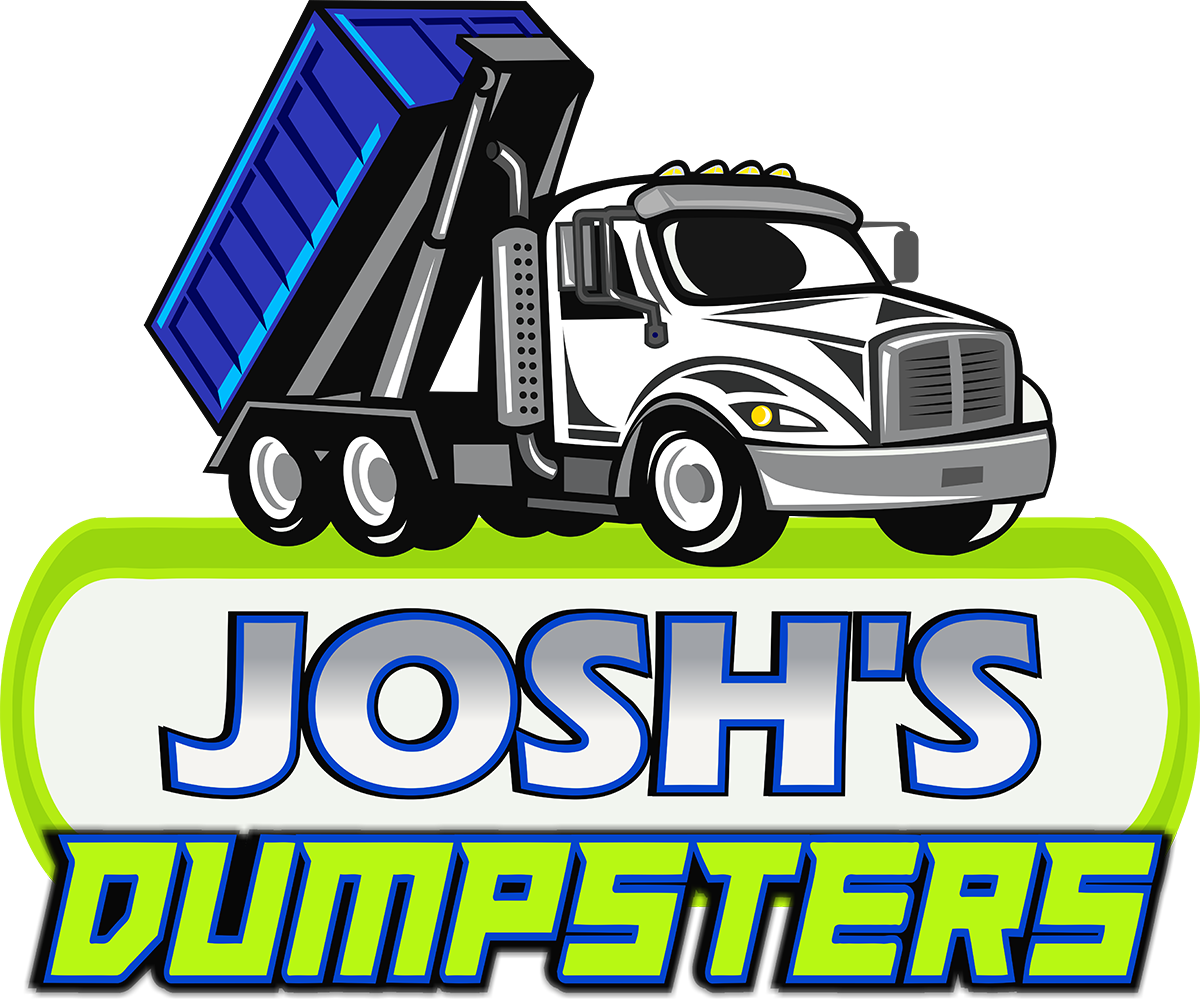
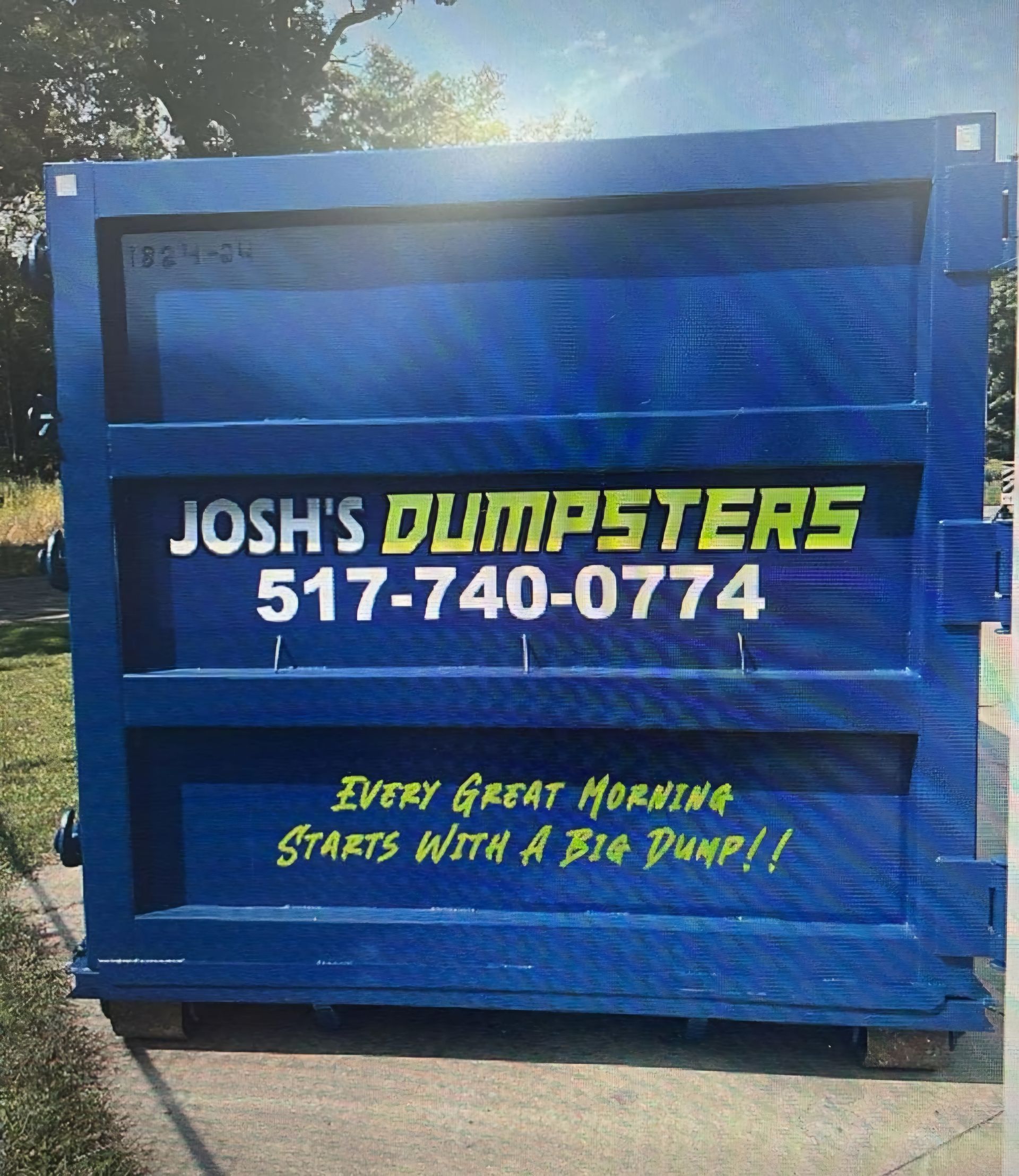
Share On: